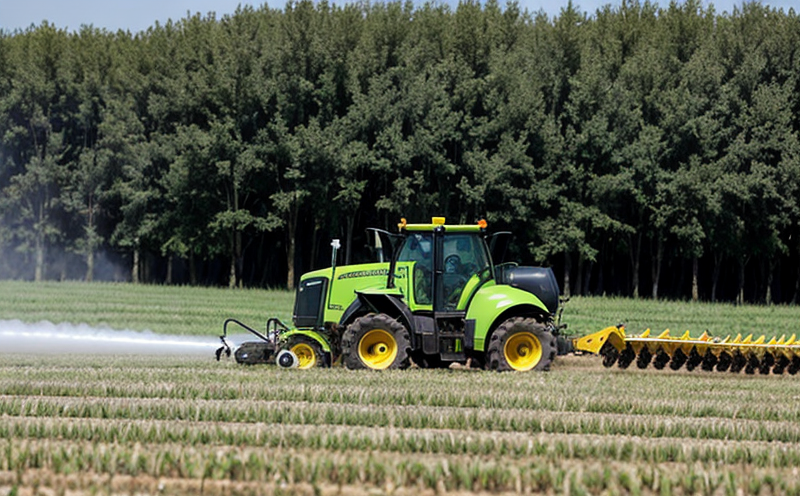Herbicide & Fungicide Residue Testing
In agriculture and forestry, ensuring that crops are free from harmful residues is critical to maintaining product safety and environmental health. Herbicides and fungicides are essential tools for crop management but can pose risks if not used appropriately. Our laboratory provides comprehensive testing services for herbicide and fungicide residue detection to help ensure the quality of agricultural products.
Herbicide and fungicide residues can accumulate in soil, water bodies, and plants, leading to potential health hazards for humans and animals. Therefore, regulatory bodies such as the FDA, EPA, and others have established strict guidelines on permissible levels of these residues in agricultural products.
Our laboratory adheres to international standards such as ISO 17025 for our testing methodologies, ensuring that all results are accurate and reliable. We use advanced analytical techniques like Liquid Chromatography-Mass Spectrometry (LC-MS) and Gas Chromatography-Mass Spectrometry (GC-MS) which allow us to detect even trace amounts of herbicide and fungicide residues.
Our testing process involves several steps, starting with the collection of samples from various sources such as soil, water, or plant materials. Once collected, these samples undergo rigorous preparation processes including extraction, purification, and concentration where necessary. After this step, we analyze them using our state-of-the-art instruments to identify and quantify any herbicide or fungicide residues present.
The results of our testing are detailed and comprehensive, providing information on the types of residues found in your samples along with their concentrations. This data can be crucial for understanding potential risks associated with specific crops or growing practices, enabling stakeholders to make informed decisions about how best to manage these chemicals safely.
Our team of experts is dedicated to delivering high-quality results promptly while maintaining strict adherence to international standards and guidelines set forth by regulatory agencies worldwide. By choosing our services, you not only gain access to accurate and reliable information but also contribute towards promoting sustainable agricultural practices that protect both people and the environment.
Customer Impact and Satisfaction
We understand that maintaining customer satisfaction is paramount in any business relationship. That's why we strive to provide exceptional service by delivering accurate, timely reports tailored specifically for your needs. Our team of experienced professionals works closely with you throughout the entire process—from sample collection advice through final analysis and reporting—to ensure all questions are answered promptly.
Our clients benefit from our expertise in identifying even minute traces of herbicide and fungicide residues which might otherwise go undetected using less sophisticated methods. This level of precision helps them make more informed decisions regarding their operations, thereby enhancing overall efficiency and profitability.
In addition to providing technical support during the testing phase, we offer consultation services aimed at helping our clients implement best practices for minimizing residue levels in agricultural products. By offering such guidance, we aim to contribute positively towards achieving sustainable agriculture goals globally.
Customer feedback plays a vital role in shaping our continuous improvement efforts. We regularly review client responses and make necessary adjustments based on their suggestions to ensure that every interaction meets or exceeds expectations. Your satisfaction is our priority, and we are committed to maintaining it through ongoing quality assurance measures and dedication to excellence in all aspects of our work.
Environmental and Sustainability Contributions
The agricultural sector plays a significant role in contributing to global food security while facing increasing pressure from environmental concerns. By ensuring that crop residues do not exceed acceptable limits, we help promote sustainable farming practices which benefit both the environment and society.
Herbicide and fungicide use is necessary for controlling pests and diseases but improper application can lead to contamination of natural resources such as soil and water bodies. Our testing services play a crucial role in preventing such incidents by providing accurate data on residue levels, allowing farmers and other stakeholders to take corrective actions promptly.
Through our work, we contribute towards protecting biodiversity and ecosystems that rely heavily on healthy agricultural practices. By promoting responsible use of pesticides, we also help reduce the risk of harm to non-target organisms like beneficial insects and wildlife species.
In conclusion, by offering reliable herbicide and fungicide residue testing services, we support the transition towards more sustainable forms of agriculture which balance productivity with environmental protection. Our efforts align closely with international sustainability initiatives aimed at ensuring a healthier planet for future generations.
Use Cases and Application Examples
Testing for herbicide and fungicide residues is applicable across various sectors within the agricultural industry, including but not limited to:
- Farmers seeking assurance about their crop quality before marketing or selling them.
- Food processors who need verification that raw materials used in production comply with regulatory requirements.
- R&D departments exploring new formulations and applications for pesticides without compromising on safety standards.
- Regulatory bodies conducting audits to enforce compliance with established guidelines.
Agricultural companies may also use our services when faced with disputes over product quality or when investigating incidents of contamination. In some cases, it's necessary to establish baseline levels before implementing new treatment protocols.
For instance, in one case study involving a large-scale farm operation, testing revealed unexpected high levels of certain herbicides in recently harvested wheat samples. Upon investigation, it was discovered that improper application techniques had led to overspraying during the previous season. Armed with this knowledge, the farmer adjusted his practices accordingly and saw significant improvements in subsequent harvests.
Another example comes from a food processing facility where concerns were raised regarding residual pesticide levels in apple juice concentrate. Using our testing services allowed them to pinpoint exactly which batches needed further scrutiny, ultimately leading to improved quality control measures across their supply chain.





